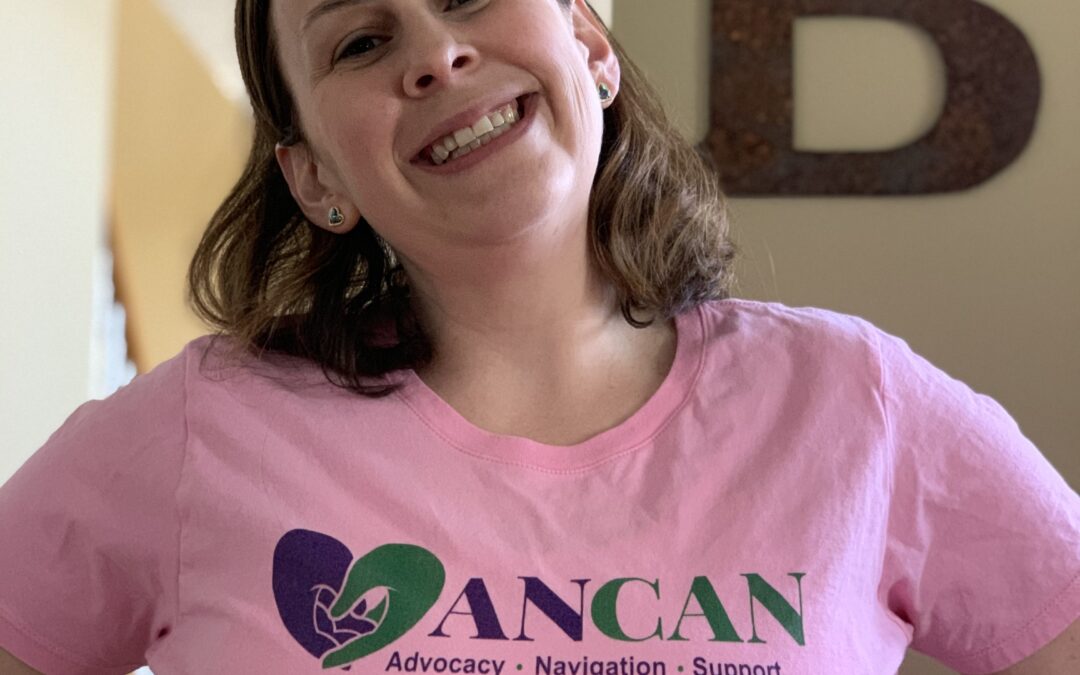
by Rick Davis | Nov 18, 2022 | Advocacy, Blood Cancers, Cancer Caregivers, Cancer Resources, mCRPC, mHSPC, nmCRPC, Ovarian Cancer, Prostate Cancer, Recent News, RMC, Volunteers, Webinars
AnCan Advisory Board Member Honored Nationally
Last night Invitae and the National Society of Genetic Counselors (NSGC) honored our amazing Advisory Board Member and Genetic Counselor, Lindsey Byrne, as one of the 14 Finalists for the Genetic Counselor of the Year Award during the National Society of Genetic Counselors Annual Conference in Nashville, TN.
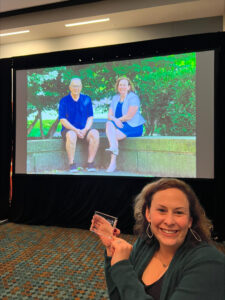 While Lindsey was not selected amongst the top 3, both we and she were honored Lindsey was invited to the Awards Ceremony. Nominated by our AnCan Advanced Prostate Cancer Group regular, Frank Fabish, who seeks his care at The Ohio State The James Comprehensive Cancer Center where Lindsey works as a Counselor and Professor, Frank and his wife Gail have benefitted and much enjoyed their consults with Lindsey. She is one of the very few genetic counselors who specializes in working with genitourinary and prostate cancer patients. Lindsey sent us a pix from the Awards Ceremony that has our Star in the foreground with nominator and nominee behind!
While Lindsey was not selected amongst the top 3, both we and she were honored Lindsey was invited to the Awards Ceremony. Nominated by our AnCan Advanced Prostate Cancer Group regular, Frank Fabish, who seeks his care at The Ohio State The James Comprehensive Cancer Center where Lindsey works as a Counselor and Professor, Frank and his wife Gail have benefitted and much enjoyed their consults with Lindsey. She is one of the very few genetic counselors who specializes in working with genitourinary and prostate cancer patients. Lindsey sent us a pix from the Awards Ceremony that has our Star in the foreground with nominator and nominee behind!
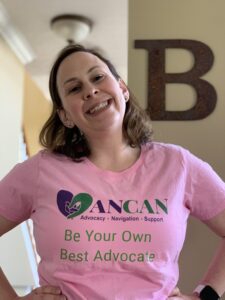 Lindsey has hosted and appeared in AnCan webinars as you see below. She also LOVES promoting our cause!
Lindsey has hosted and appeared in AnCan webinars as you see below. She also LOVES promoting our cause!
by Hannah Garrison | Jun 24, 2022 | Blood Cancers
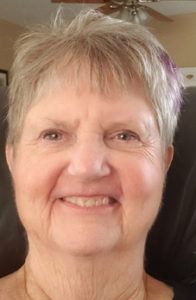 From Conquer Magazine’s Sally Torgeson:
From Conquer Magazine’s Sally Torgeson:
“Sally Torgeson explains the help a myeloma coach can help newly diagnosed patients with [including] the vast array of information, emotional, and financial demands of this type of blood cancer.”
She was diagnosed in 2018, and is a Myeloma Coach with the Myeloma Crowd.
The beginnings of a new diagnosis can be troubling, confusing, heartbreaking – the list goes on. A new diagnosis like this is a lot to take in, to say the least. Multiple Myeloma patients can feel isolated, especially as this disease is considered rare. Suddenly you have a bajillion tons of information thrown at you from your doctor’s visits.
“All Myeloma Coaches are patients or care partners who assist newly diagnosed patients with multiple myeloma or their caregivers.”
Read Sally Torgeson’s article here to learn a little bit more about what a myeloma coach is and how a myeloma coach can help you navigate all of your new life’s aspects.

by Rick Davis | Apr 21, 2022 | Advocacy, Blood Cancers, Brain Tumors, Cancer Caregivers, Cancer Resources, mCRPC, Men 'Speaking Freely', Men's Breast Cancer, Multiple Sclerosis, nmCRPC, Ovarian Cancer, Prostate Cancer, Recent News, Sarcoidosis, Thyroid Cancer, Women's Breast Cancer
Time Toxicity raises thoughts …
 Some may have read the excellent ediorial written by Moderator Ben Nathanson in a recent High Risk/Recurrent/Advanced Prostate Cancer Reminder. Ben explains ‘time toxicity’ … a concept that effects many living with serious disease. If you missed his musings, here they are again:
Some may have read the excellent ediorial written by Moderator Ben Nathanson in a recent High Risk/Recurrent/Advanced Prostate Cancer Reminder. Ben explains ‘time toxicity’ … a concept that effects many living with serious disease. If you missed his musings, here they are again:
Treatment that gives us time to live demands time in return. It drags with it scans, blood work, drives to the hospital, doctors running late, computers down, battles with insurance. Part of our gained lifetime is lost in dead time.
Toxicity is always in the cancer mix. Financial toxicity has become part of the conversation alongside physiological toxicity, and time toxicity — time lost in an effort to gain time — is joining it.
In a thoughtful 2018 essay, physician Karen Daily notes “Much of our patients’ time investments remain invisible to clinicians.” This year, in ASCO’s lead journal, three physicians have taken up the challenge, proposing that clinical trials, when reporting overall survival, distinguish between “Days with Physical Health Care System Contact” and days the patients actually own — “Home Days.” This a new idea only in cancer, say the authors — cardiology and other fields already make these kinds of measurements.
When medicine’s best offer is a handful of months, we face difficult choices. Time toxicity casts a shadow over both survival time and quality of life. As we try to balance days added against side effects, it would be good to know how much of the time we’re gaining will be ours to spend.
Reading Ben’s thoughts prompted one of our regular participants to write a reply to us both that touched me to the core. I asked if we could reprint that too, and was graciously given permission on condition of anonymity. Here it is!
Ben, thanks for the article on “time toxicity” in the (recent) meeting announcement. It identifies an important consideration for all to think about in the fight vs. cancer and from my personal experience an impact that changes over time. Your write-up got me to thinking and pushed me to a holistic realization that this is basically an investment decision with expected returns.
For the prostate component of my cancer fight (now 17 years and counting), I did not think about the time investment in the first 14 years that I (and family members) were making to “do battle” (eg lab work, appointments with doctors, scans, treatments, family meetings, insurance challenges and personal downtime / reduced effectiveness in work due to treatment, etc.), It was a “no-brainer” decision and I never considered the tradeoff as the benefits for the opportunity to “continue to live life” due to treatments as my “life” returns were overwhelmingly positive vs.the “investment” required to do battle.
Having retired three years ago and simultaneously entering a new phase of my cancer fight I am aware of the increased time I (and family members) now spend on cancer treatment yet obtaining reduced time for life (and quality of life). I’m now spending significantly more time at Doctors appointments, treatments and longer periods of time post treatment feeling the physical effects of treatment and have begun to recognize I’m going to hit a point where this equation gets out of balance….and I’m not equipped with a decision model to manage that occurrence. Given my personal nature is to grind on stuff (I can make it work, give me time and let me try!) — I’m likely to blow right past the point of equilibrium where time toxicity and balance of life toxicity begin to get out of hand. For much of the first 14 years of my cancer fight I practiced a very large (and for me, healthy) dose of self-denial that I was dealing with prostate cancer. I was able to keep the cancer part of my life cordoned off, did not have significant residual time spent thinking / worrying / etc. about the disease and lived life to the max both personally and professionally. Now, in the last three years I am finding growing quantities of “thinking time” consumed by the disease and also sucking family members…. wife and children….deeper into the cancer battle as discussions / time encroach on them as well increasing the cost of investment (time) in the battle vs. cancer.
Prostate cancer is my second cancer fight, Ten years prior to the prostate cancer diagnosis I was diagnosed with a rare leukemia (rare as it was diagnosed in a limited number of folks (~2,000 / per year in the United States) and was usually fatal shortly after diagnosis as there were no lasting treatments until about 4 years prior to my diagnosis. As a freak outcome of scientific research a drug treatment was developed; the drug was intended for another cancer that had a much larger annual incidence of new cases; the drug was not effective on the targeted cancer but it was very effective on the rare leukemia. And at the time the treatment protocol was 7 days of continuous drip via a small pump one wore around the waist as an outpatient; minimal side effects; and if the first treatment didn’t work a second round was almost guaranteed to work. Talk about lucky! There was no way research funds would have been spent on this cure except by accident — which was exactly the case. The time toxicity for me in my first cancer battle was non-existent and I believe has indirectly helped me in the prostate cancer fight by giving me a dose of optimism and coping skills.
I think the topics raised by both of you….including Rick’s statement on treatment longevity results are important for the group to consider. These are relevant points of management in the cancer battle that I haven’t seen addressed by my oncologists (except one) nor psychologists and psychiatrists that I’ve also used in my treatment.
Editor’s Comment: In the original Reminder, I responded to Ben’s comments by adding one of my own. I pointed out that frequently Overall Survival benefits were shorter than might be expected because trials are often run on patients at a very late stage of their disease. This caveat should be considerd when we see the FDA reporting short life extension, sometimes as few as 2 or 3 months, for newly approved drugs.(rd)
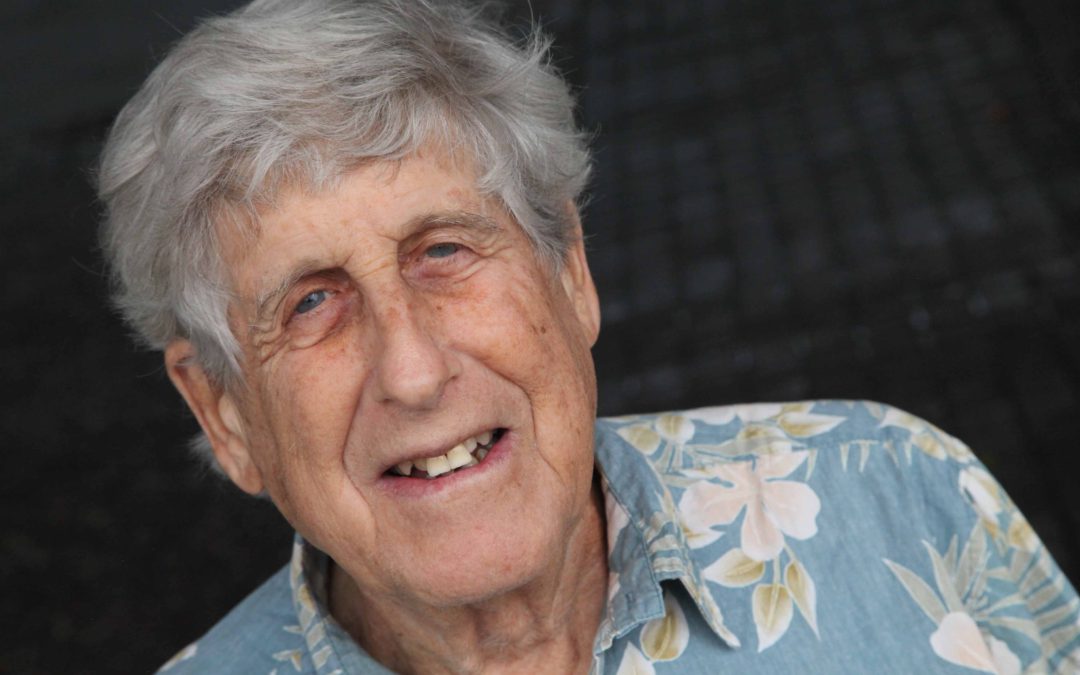
by Rick Davis | Apr 10, 2022 | Blood Cancers, Brain Tumors, Cancer Caregivers, mCRPC, nmCRPC, Ovarian Cancer, Prostate Cancer, Recent News, RMC, Thyroid Cancer, Women's Breast Cancer
Care Partners and a Woman’s Perspective
Peter Kafka’s words this week allow us to plug our wonderful Stage 3 & 4 Cancer Caregivers Group …. although Peter’s words should encourage us to consider changing its title! I have seen them in compassionate action this week reaching out to a caregiver whose daughter was recently diagnosed with a difficult T3 lung cancer, and they are magnificent.
Led by former USAF Lt. Col and Women’s Health Nurse Practitoner, Susan Lahaie, our other Moderators include Pat Washburn and Barbara Dyskant, all of whom have lost partners to cancer – Susan and Barbara to prostate cancer, and Pat to breast cancer. The Group meets 1st & 3rd Tuesdays at 8.00 pm Eastern in our Barniskis Room. While all caregivers are invited to both groups, we do not discuss grief and bereavement during our 1st Tuesday meetings. Check out the Group and sign up at https://ancan.org/cancer-caregivers/
Back to Peter Kafka’s thoughts that speak volumes adn endorse the message above:
A WOMAN’S PERSPECTIVE
I recently stumbled upon a book published back in 1897, THE WOMAN IN BATTLE, by Madame Loreta Janeta Velazquez. I have not finished it at this writing, but it has already stimulated a number of thoughts relative to our individual journeys with prostate cancer.
Madame Velazquez was a young and quite ambitious woman who disguised herself as a man and fought in the United States Civil War as an officer in the army of the Confederacy. What intrigues me about her story is that it is a candid first-hand account of battles, conflict, life in the masculine military and observations of male attitudes and behavior from a female perspective. I don’t want to go into detail about her accounts other than to say that she charged right into the fray, doing battle from the start on the front line at the Battle of Bull Run.
I bring this story up as I said because I find it relevant to my own “battle”, and perhaps yours as well, with prostate cancer. Many of us on this journey have female partners who are in their own way affected by the nature of our own infliction with prostate cancer needing some form of treatment and intervention. But we rarely, if at all in our meetings hear of this experience from the female perspective. I know that we (AnCan) and other support organizations facilitate gatherings for caregivers that give partners some outlet of expression. But for myself and many of you most of our female partners would not categorize themselves at “care givers”. They are our partners who have been thrown into the fray by no choice of their own and have tried to navigate their way through the obstacles that our disease has presented.
Recently at one of our meetings a participant asked if I knew of a woman that could speak to his wife about what to expect and experience relative to a course of ADT drugs which he was about to embark upon. This request stopped me in my tracks because I had never had such a request before. It took me a while but I was able to find a woman who was of a similar age and experience who was willing to dialogue with this man’s wife. It is never hard to find another man with experience to speak with regarding any number of prostate cancer treatment protocols. I have often relied on other “brothers” as many of you no doubt have as well. But for those of us who have female partners, they are sometimes left adrift to fend for themselves, only hearing our own complaints and miseries and sometimes the opinions of our treating physicians.
But it is important to remind ourselves that if we are blessed with a woman in our life, that they too are going through changes and challenges as a result of our prostate cancer diagnosis. Their experience and perspective are just as valid and important as our own. This is not just a MALE disease because it can affect many of the ways that we relate to female partners, physically, emotionally and mentally. It is not often that female partners join in on our calls, but they are never excluded from most of our discussions and their perspective is very much valued.
Cancer Caregivers | Virtual Support Calls For Cancer Caregivers
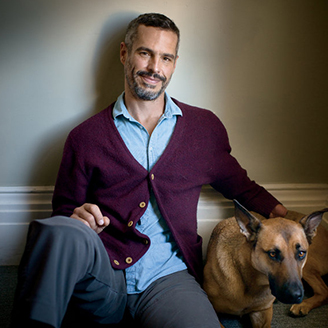
by Rick Davis | Jan 20, 2022 | Blood Cancers, Brain Tumors, Cancer Caregivers, Cancer Resources, Health Resources, hospice and palliative, Multiple Sclerosis, nmCRPC, Ovarian Cancer, Prostate Cancer, Recent News, RMC, Thyroid Cancer, Women's Breast Cancer
What do oncologists have against palliative care ….?
If you regularly attend AnCan’s virtual chat support groups, you are sure to know that whatever the condition, we frequently recommend palliative care … almost anytime and place we can.
And NO – palliative care is not about dying – it’s about preserving Quality of Life. Some of the smarter institutions have figured that changing the name to an acronym like Symptom Management Service at UCSF or Supportive Care at Memorial Sloan Kettering may account for greater acceptance and higher quality. It may also explain why these two institutions are among the best in the biz. Others like City of Hope, that still keep Palliative in their name, struggle to make palliative care easily available to their patients.
A recent article in Hospice News reports that “Cancer Patients Often Not Referred to Palliative, Mental Health Care”. Amongst 240 surveyed oncologists, only 17% referred their patients to palliative care early in the disease process. Yet many studies show that the earlier a patient is referred to palliative care, the better the outcome – especially for cancer. On more than one occasion at the same NCCN hospital, AnCan has had to navigate a participant to self refer to palliative care in order to receive treatment. In one instance, this even involved the Chief Medical Oncologist.
Given the underpinning principle in medical ethics of ‘Do No Harm’, essentially embodied in the Hippocratic Oath, how can this be?
At AnCan, we have a theory, we see this as a control issue. For some oncologists, and maybe other specialties who might collaborate with palliative care too, they are uncomfortable sharing patient management with other docs in essential areas like palliating comorbidities. While palliative care physicians are required to stay up on developments in pain treatment, antiemetic (nausea) drugs, and other forms of supportive care, oncologists have their heads buried in cancer care.
AnCan is very fortunate to have Dr. BJ Miller, one of the foremost palliative care gurus in the US, on our Advisory Board. If you doubt that, BJ’s TED Talk is now up to 14.6 million views! Dr.Miller now practices his profession from his own organization, Mettle Health; his services have comforted several AnCan participants. So we thought we would ask Dr. BJ Miller for his view on an issue he has lived with for many years …..
” I think medical training is part of the problem, as is confusing messaging around what is palliative care. and i agree that a piece of the problem is related to control, and, related, misunderstandings about how palliative care works (ie, as an additional layer of support that makes the treating physician’s life easier as well as his patients’; not a service that will steal your patient away or somehow undermine your authority).
and then there’s the culture of medicine, where death is the enemy and suffering is just part of the cost of doing business; and where medical issues are taught as separate from the psychosocial and spiritual issues a patient faces.
lastly, medicine generally does not include the caregiver/family in the equation, where much of the suffering happens.” …….. Tx BJ!
Sharing patient management may not come naturally to many physicians, especially if not part of their institutional culture. At AnCan we say, let the doctor most specialized in each aspect of care take responsibility for it on behalf of the patient. When inappropriate doctors stand in the way, the patient suffers.
Of course, AnCan is a patient driven organization ….. we welcome a response from other docs to explain what we are missing!

by Rick Davis | Oct 24, 2021 | Advocacy, Blood Cancers, Cancer Caregivers, Cancer Resources, mCRPC, Men's Breast Cancer, Multiple Sclerosis, nmCRPC, Ovarian Cancer, Prostate Cancer, Recent News, RMC, Sarcoidosis, Thyroid Cancer, Women's Breast Cancer
‘BEING’ YOUR OWN BEST ADVOCATE
A few very important words from one of senior moderators, Peter Kafka! (rd)
We often stress the importance of “being one’s own best advocate” at our online AnCan support gatherings. After several recent personal experiences and hearing about others I thought it might be appropriate to add another word to this maxim, and that would be “vigilant”.
All too often I have noticed that I can get complacent when dealing with routine medical appointments and assume that the professionals I am working with are focused and have my best interests front and center. But like me, my medical team are human and can make mistakes and assumptions that are wrong.
Earlier this week I was at a lab I had been to many times before to get my monthly blood tests. The tech was new, but I had filled out the orders online when making my appointment and had my doctor’s standing order with me. I had my sleeve rolled up and the tech was getting ready to unwrap the needle to jab me when I noticed that she only had one test tube out for sampling. I questioned this because I usually fill three or four. She said; “We’re just doing hemoglobin, right?” “No!” I replied, pulling out my previous month’s results from the notebook on my lap. “We’re doing CBC’s, Hepatic, PSA, Testosterone and more.” She retreated into the back room to consult with her supervisor and both reappeared with an apology and proceeded with the whole enchilada.
I was reminded of another occasion when I was in the hospital for a day or two after surgery from a broken femur. Looking up from my hospital bed I saw the notation on the white board that I was listed as a diabetic. No wonder my meal was so bland. Turned out that just because I was taking Metformin as a pharmaceutical for my prostate cancer their assumption was that I was diabetic. I had to straighten out their confusion.
Over the years I have learned that I need to be on “high alert” when undergoing any medical procedure, routine or otherwise. Mistakes are all too easy to make. Some might be inconsequential, but others can have serious implications. In this time when getting inoculations for covid-19, seasonal flu, shingles or other shots down the street at the local pharmacy it is doubly important to stay vigilant. Yes, these professionals are all too careful to make sure that our names and date of birth are correct on the orders and labels, but what about the injected drug or prescription? I bet that many of us have stories to tell.
So, keep your eyes open, stay vigilant, and ask questions. “Being one’s own best advocate” requires us to step up and get involved so that we understand and know the twists and curves of our medical journey even if it seems to be uncharted territory. It is our journey after all.

 While Lindsey was not selected amongst the top 3, both we and she were honored Lindsey was invited to the Awards Ceremony. Nominated by our AnCan Advanced Prostate Cancer Group regular, Frank Fabish, who seeks his care at The Ohio State The James Comprehensive Cancer Center where Lindsey works as a Counselor and Professor, Frank and his wife Gail have benefitted and much enjoyed their consults with Lindsey. She is one of the very few genetic counselors who specializes in working with genitourinary and prostate cancer patients. Lindsey sent us a pix from the Awards Ceremony that has our Star in the foreground with nominator and nominee behind!
While Lindsey was not selected amongst the top 3, both we and she were honored Lindsey was invited to the Awards Ceremony. Nominated by our AnCan Advanced Prostate Cancer Group regular, Frank Fabish, who seeks his care at The Ohio State The James Comprehensive Cancer Center where Lindsey works as a Counselor and Professor, Frank and his wife Gail have benefitted and much enjoyed their consults with Lindsey. She is one of the very few genetic counselors who specializes in working with genitourinary and prostate cancer patients. Lindsey sent us a pix from the Awards Ceremony that has our Star in the foreground with nominator and nominee behind! Lindsey has hosted and appeared in AnCan webinars as you see below. She also LOVES promoting our cause!
Lindsey has hosted and appeared in AnCan webinars as you see below. She also LOVES promoting our cause!
 From Conquer Magazine’s Sally Torgeson:
From Conquer Magazine’s Sally Torgeson:
 Some may have read the excellent ediorial written by
Some may have read the excellent ediorial written by 
